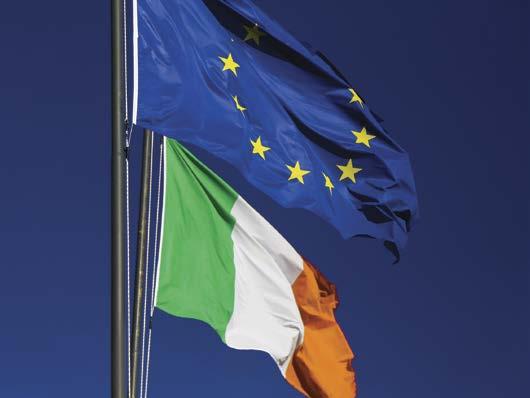
6 minute read
News and views
BREXIT
HONG KONG
Hong KongAsEAN pact to take effect
With the final round of Brexit negotiations underway, more than three-quarters of businesses (77%) say they want a deal to be agreed. Only 4% say they prefer a no deal scenario.
The impact of the pandemic has lessened businesses’ ability to prepare for Brexit, with nearly half (47%) saying that the impact of dealing with Covid-19 has negatively affected preparations. The findings come as the CBI’s latest Growth Indicator reports that private sector activity fell in the quarter to September, but at a slower pace than last month (-23% from -39%), marking the third consecutive month in which the rate of decline has eased. Dame Carolyn Fairbairn, CBI DirectorGeneral, said: “Now must be the time for political leadership and the spirit of compromise to shine through on both sides. A deal can and must be made.
“Businesses face a hat-trick of unprecedented challenges: rebuilding from the first wave of Covid-19, dealing with the resurgence of the virus and preparing for significant changes to the UK’s trading relationship with the EU. More than three-quarters of businesses want to see a deal that will support people’s jobs and livelihoods. This matters for firms and communities across Europe.
“For the whole continent, the pandemic has diminished firms’ ability to prepare for an abrupt interruption of restrictions on trade and movement between the UK
© Getty images/istockphoto
and the EU. A good deal will provide the strongest possible foundation as countries build back from the pandemic. It would keep UK firms competitive by minimising red tape and extra costs, freeing much needed time and resource to overcome the difficult times ahead.
“Governments across Europe have shown a level of ambition to fight the pandemic many wouldn’t have believed – it’s time to show that same creativity and flexibility on securing a Brexit deal.”
The composite measure, based on 648 responses (to surveys conducted between 26 August and 15 September 2020), saw activity in the distribution sector stabilise in the quarter to September (-1% from -26%), after five rolling quarters of decline. The pace of decline also slowed again in manufacturing (-20% from -46%), consumer services (-39% from -64%) and business and professional services (-28% from -32%).
Looking ahead, the fall in private sector activity is expected to ease again over the next three months (-11%). While distribution firms expect activity to fall (-23%), consumer services (-22%) and manufacturers (-6%) expect a further easing, while business & professional services firms (-2%) expect business volumes to stabilise.
A supplementary question found that private sector activity on the whole remains 16% below what would be expected under ‘normal conditions’ (i.e. in the absence of Covid-19).

The commitments relating to Hong Kong and Brunei Darussalam, an Association of Southeast Asian Nations (ASEAN) member state, under the trade and investment agreements between Hong Kong and ASEAN will enter into force on 20 October 2020.
Tariff reduction commitments under the Free Trade Agreement covers different kinds of Hong Kong commodities, including jewellery, apparel and clothing accessories, watches and clocks, and toys.
Hong Kong service providers will enjoy better business opportunities and legal certainty in market access for services sectors in Brunei Darussalam, such as business, telecommunications, construction and related engineering, education, tourism and travel related services, and transport services that have traditional strengths or potential for development. Upon the Investment Agreement’s implementation, Brunei Darussalam will provide Hong Kong enterprises investing in its area with fair and equitable treatment of their investments, physical protection and security of their investments, and the assurance of the free transfer of their investments and returns.
So far, the commitments relating to the eight ASEAN member states of Indonesia, Laos, Malaysia, Myanmar, the Philippines, Singapore, Thailand and Vietnam have taken effect.
IRELAND
Republic of Ireland transposes Fifth AML Directive into national law
TRADE
Trade Hub launched to support scottish businesses
© Getty images/istockphoto

Member states of the European Union were required to introduce legislation by 10 January 2020 to transpose the Fifth Anti-Money Laundering Directive (5AMLD) into national law. The Irish government has now published the Criminal Justice (Money Laundering and Terrorist Financing) (Amendment) Bill 2020, which proposes to amend the Criminal Justice (Money Laundering and Terrorist Financing) Acts 2010-2018. The new Bill reflects the legislative outline set out previously in the 2019 General Scheme with some changes (for example, the scheme proposed legislative provisions to support the Criminal Assets Bureau and An Garda Síochána in the administration of their AML/CTF functions by improving their access to bank records in electronic form).
Although the Bill transposes the majority of 5AMLD’s requirements, significant provisions remain outstanding. In August, the government announced that the Department of Finance would legislate for the establishment of a central register of beneficial ownership for express trusts and the establishment of centralised national bank and payment account registers. It is now likely that these will be legislated for separately, along with provisions in respect of Virtual Asset Service Providers regulation.
The new Bill introduces amendments to high and low risk factors, customer due diligence requirements, extending the scope of regulation and clarifying PEPs and beneficial ownership information. A new Trade Hub dedicated to helping businesses in Scotland thrive and grow internationally has been launched, intended to provide support for thousands of companies in economically challenging times.
UK government exports minister Graham Stuart MP met with Scottish businesses and representative organisations, including FSB Scotland, NFU Scotland, the Scottish Council for Development and others, to discuss the support available for companies in the region. Based in Edinburgh’s Queen
DISQUALIFICATION
Analytica boss
Alexander Nix has been banned from running limited companies for seven years after permitting companies to offer potentially unethical services to prospective clients.
Within the undertaking, Alexander
Nix did not dispute that he caused or permitted SCL Elections Ltd or associated companies to market themselves as offering potentially unethical services to prospective clients, demonstrating a lack of commercial probity.
Effective from 5 October 2020,
Alexander Nix is disqualified for seven years from acting as a director or directly or indirectly becoming

Elizabeth House, the UK Department for International Trade’s new Scotland Hub will provide businesses with greatly increased trade support.
Through the Trade Hub, businesses will be able to utilise the UK government’s global networks, expertise and influence, as well as world-leading credit agency UK Export Finance (UKEF), to grow their overseas trade and build back from the impact of coronavirus. Leveraging the strength and reach of the UK government, the hub will deliver effective services for
seven year disqualification for Cambridge
people and businesses in Scotland. involved, without the permission of the court, in the promotion, formation or management of a company.
Alexander Nix was a director of SCL Elections Ltd, a company that provided data analytics, marketing and communication services to political and commercial customers. He was also a director of five other connected UK companies: SCL Group Ltd, SCL Social Ltd, SCL Analytics Ltd, SCL Commercial Ltd and Cambridge Analytica (UK) Ltd.
All six companies entered into administration in May 2018 before entering into compulsory liquidation in April 2019.









